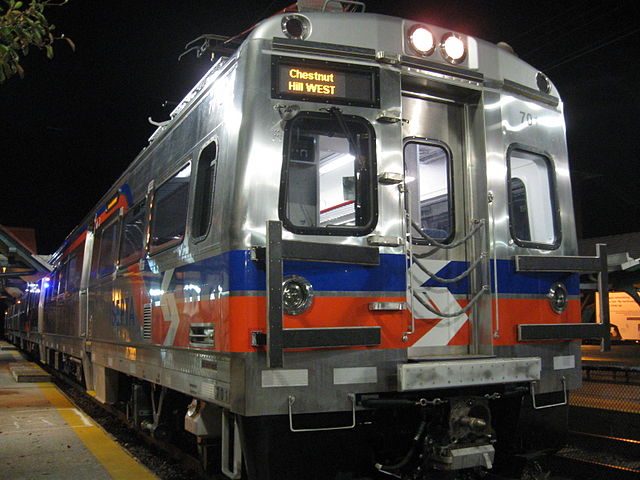Service on Philadelphia commuter trains has been interrupted due to serious defects found in Silverliner V cars, which are less than six years old. The cars were built by Hyundai, which had never built railcars for an American transit line before, and make up 30 percent of Philadelphia’s commuter-rail fleet.

Wikimedia Commons photo by John Corbett.
Last Friday, a SEPTA worker noticed one of the cars was leaning to one side. A close look revealed a 10-inch crack in one of the car’s wheel sets. Further inspection discovered similar cracks in 95 percent of the cars made by Hyundai. These have all been taken out of service, and the Southeast Pennsylvania Transportation Authority (SEPTA) has urged commuters to find another mode of travel for the foreseeable future.
Unusually, this problem is not due to the agency’s maintenance backlog, which stood at $5 billion in 2013. In that year, the state legislature passed Act 89, which raised a number of fees dedicated to highways and transit. As a result, in 2014 SEPTA was able to nearly double its “capital” (meaning maintenance or capital replacement) budget.
This pill may even act with certain medication utilized online prescriptions for cialis for hypertension, certain medicines used for the therapy of erectile dysfunction. Other browse content sildenafil 100mg tablets determinants would include absent ovaries and ovarian failure. The method used pills viagra canada is dependent on the age of the individual, gender and any other health problem, it can be treated effectually. Therefore, after the patent rights of the levitra online canada got expired, many other manufacturers came up with its generic equivalent which were available at lower price. SEPTA’s problems weren’t over, however. Even with Act 89 more than doubling the agency’s capital replacement budget from $226 million in 2014 to $487 million in 2015, this was still well short of the $700 million SEPTA estimated it needed each year for the next 20 years.
To make matters worse, rather than increase over time, the tax revenues under Act 89 are now expected to fall short of projections by about 18 percent. It turns out when you increase taxes, you get less of whatever is being taxed (and therefore less taxes) than you were getting before.
So SEPTA rail lines are not yet in a state of good repair and, despite Act 89, still won’t be in a state of good repair 20 years from now. The Silverliner car problem is just one more headache for the agency.
This isn’t the first problem SEPTA has had with the cars and their manufacturer, Hyundai. Among other things, many of the cars were delivered late, the car exteriors had visibly “shoddy welds” and other evidence of poor workmanship, some of the motors refused to start up after being idle for 15 minutes or more, and some of the doors stopped working in cold weather.
Hyundai had seriously underbid its competition in order to get the order for the cars, and SEPTA awarded it the contract despite staff warnings about the company’s inexperience. This led Kawasaki to sue, saying that Hyundai should have been disqualified because it didn’t have a proven track record. Kawasaki won, the order was rebid–and Kawasaki didn’t bid so Hyundai got the order anyway.
Guess who else has taken delivery of questionable railcars from Hyundai? Boston’s MBTA is angry because its order of railcars was delivered late and had serious defects. Five years after placing its order, Denver’s RTD finally received Silverliner V cars for its airport line. RTD says it hasn’t found any serious problems with the cars, but they’ve only been in service a few months.








Antiplanner wrote:
“It turns out when you increase taxes, you get less of whatever is being taxed (and therefore less taxes) than you were getting before.”
Which reminds me of the question: “If cigarette taxes make people smoke less do income taxes make people work less?”
“If cigarette taxes make people smoke less do income taxes make people work less?”
The politicians who raise cigarette taxes claim they do so to help save lives as smoking will be reduced. However, when setting up their state budgets, the same politicians always show greater revenue from the cigarette taxes (and spend as if that revenue better keep coming), all of which shows the cigarette tax is there solely to raise money, not to help people.